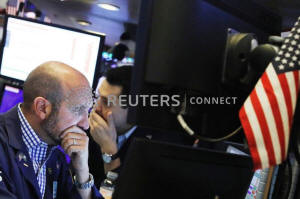Wall Street Weekahead: Investors look at dollar stores as U.S. recession
fears increase
 Send a link to a friend
Send a link to a friend
 [August 24, 2019]
By David Randall [August 24, 2019]
By David Randall
NEW YORK (Reuters) - More investors are
watching the shares of discount retailers like Dollar General Corp <DG.N>
and Dollar Tree Inc <DLTR.O>, which perform better during economic
downturns, in the hopes of gauging changes in consumer behavior, though
higher tariffs may erode the companies' ability to act as economic
bellwethers.
Fund managers and analysts say that they are looking for signs of a
so-called "trade-down trade", in which consumers forgo shopping at
higher-end department stores or supermarkets in favor of the more
limited selection but lower prices at deep discounters. Between December
2008 and December 2011, for instance, shares of Dollar Tree soared
nearly 200% as consumers pinched pennies during the Great Recession,
while the benchmark S&P 500 gained just 39% over the same time.
For the year to date, shares of Dollar Tree are up 7.3% as it integrates
its purchase of former competitor Family Dollar, while shares of Dollar
General are up 28.4%. Both companies are scheduled to report earnings
Aug. 29.

"The good news is consumers often shop more at the dollar stores during
periods of economic weakness. We wouldn't expect a sharp increase in
sales, but we suspect sales will remain stable at the dollar stores
while other companies may feel greater pain," said Mark DeVaul, a
portfolio manager at the Hennessy Equity and Income fund, who has a
position in Dollar Tree.
"We believe the treasure hunt shopping atmosphere will continue to drive
traffic and somewhat insulate them from competition from Amazon."
There are no indications that the United States is currently in a
recession, though investors are becoming increasingly worried that the
longest economic expansion in U.S. history is nearing its end.
Earlier this month, Goldman Sachs said that the likelihood that the
trade war between the U.S. and China leads to a recession are increasing
and that it no longer expects a trade deal between the world's two
largest economies before the 2020 U.S. presidential election.
Morgan Stanley, meanwhile, forecast that if the United States increases
tariffs on all imports from China to 25 percent for 4-6 months, and
China takes countermeasures, a U.S. recession would follow in three
quarters.
The spread between the yields of shorter- and longer-duration Treasury
bonds slipped below zero earlier this year, a so-called yield curve
inversion which has presaged recessions in the past. The yield of
30-year Treasuries hit record lows last week, a sign that investors are
betting on slower economic growth and low inflation.
[to top of second column]
|

Traders work on the floor of the New York Stock Exchange shortly
after the closing bell in New York, U.S., August 23, 2019.
REUTERS/Lucas Jackson

A trade-down trade in the face of economic weakness could also
benefit deep discount retailers such as Five Below Inc <FIVE.O>,
National Vision Holdings Inc <EYE.O>, and Ollie's Bargain Outlet
Holdings Inc <OLLI.O> that have solid balance sheets, noted Anthony
Chukumba, managing director at Loop Capital Markets. Higher-end
retailers like Best Buy Co Inc <BBY.N>, meanwhile, would likely
underperform, he said.
"With the likelihood of a recession creeping up, we believe
investors should start paying more attention to specialty hardlines
retailers’ capital structures," he said.
Dollar General, in particular, may continue to outperform due to its
strong management team and inventory control, said Charles Grom, an
analyst at Gordon Haskett Research Advisors.
"This is one of our best ideas and we think there's an above-average
chance that they will be raising their guidance" when the company
reports its results and "mirror what Target did", he said. Shares of
Target Corp <TGT.N> jumped over 19% and hit record highs after the
company posted better-than-expected sales growth on Tuesday.
Yet deep discounters like Dollar Tree and Dollar General are not
immune from the economic impacts of the trade war between the U.S.
and China. Dollar Tree, for example, imports an estimated 60% of its
inventory from China and could be forced into raising prices if it
is no longer able to get concessions from its vendors, said DeVaul,
the Hennessy fund manager.

"They may have to 'break the buck' and raise prices, but the risk
there is that by doing so they could piss off a lot of people and
not get them back," he said.
(Reporting by David Randall; Editing by Jennifer Ablan and Nick
Zieminski)
[© 2019 Thomson Reuters. All rights
reserved.]
Copyright 2019 Reuters. All rights reserved. This material may not be published,
broadcast, rewritten or redistributed.
Thompson Reuters is solely responsible for this content. |